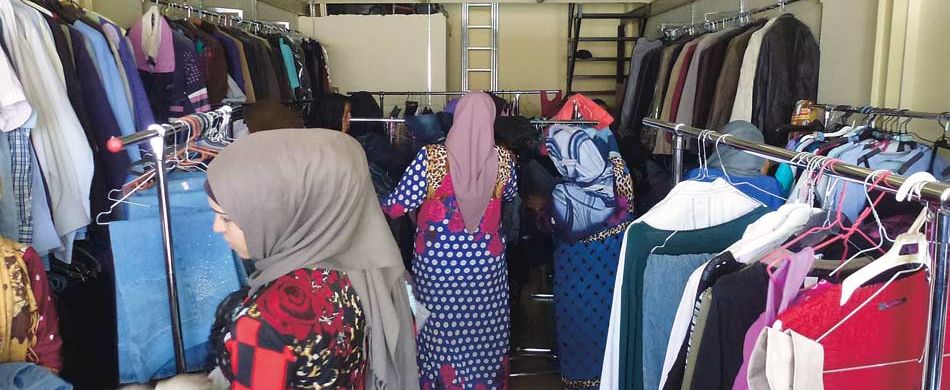Grace in Zahle
THE June 13, 2016 project has become a reality: the friars and the volunteers of Zahle, in Lebanon, have strengthened aid to the Syrian refugee camp of El Fayda thanks to the foundation of the Saint Anthony Centre, which has also become a point of reference for all the poor of the area.
We left them a year and a half ago at the starting blocks, in charge of a small but great project which we asked you to support, dear readers, on June 13 last year on the occasion of the Feast of Our Saint. We are talking about the Conventual Franciscan friars of Zahle, Lebanon, on the border with Syria. These friars are helped by many lay Christians from local parishes and ecclesial groups in welcoming Syrian refugees from the El Fayda camp, just outside the city limits. Thanks to St. Anthony’s Charities and to the readers of the Messenger of Saint Anthony, their dream has now become reality. Thanks to all these concerted efforts the Saint Anthony of Padua Social Centre has finally been established in the industrial zone of Zahle.
Twofold benefit
The Centre has not only become the beating heart of the activities of the refugee camp, it is also addressing the needs of the poor in surrounding areas. Working out of two rooms, the Centre now hosts two main activities: on one side a tailors/laundry which collects, mends and cleans used clothes, and then distributes them to the needy; and on the other, a popular kitchen which dispenses hot meals daily not only to refugees, but also to the many other poor people in the area. Charity as an end in itself, however, does not solve every problem. This is why in the plans of the Franciscan centre there is also an educational mission: to deliver tailoring and cooking courses in order to create professional figures, jobs and perhaps even synergies with other workers and craftsmen in the area.
Health and education
The project supported by St. Anthony’s Charities in Lebanon, however, is not limited to the service centre. In fact, at the El Fayda camp, friars and volunteers work incessantly to bring medicines, water, but above all else, education and recreational activities to the youngest children. Two tents in the centre of the camp continue to act as a school, a meeting room and a multi-purpose centre for training women, often the most at risk of violence and exploitation in the life of refugee camps. A large space is also provided for creativity, with workshops for crafts, drawing and games – very important activities to provide the little ones with some sense of a possible normality. Some of the young helpers specialise in recreational activities, and come to the camp with their puppet theatre.
Olives and walnuts
Another aspect of the Saint Anthony project in Lebanon leads us, finally, to a hilly area, a few kilometres from the centre of Zahle and from the Syrian refugee camp. Browsing through the photos of that hill covered with walnut and olive trees planted by the Franciscan friars for the purpose of creating an extra source of income for these poor people, hope in the innate goodness of humanity is strengthened.
Of course, the mission in Zahle is still in progress, but so much effort has already been put in and there is no lack of good will. The beneficiaries of these projects are mostly Muslims, but Christian refugees continue to arrive from Syria in increasing numbers. In such difficult situations it is important to give signals and examples of peaceful coexistence, of the possibility of living together with mutual respect and harmony. This concrete and selfless solidarity is capable of breaking down every wall.
Abouna-Father
Monsignor César Essayan, Apostolic Vicariate of Beirut since October 2016 and the first point of contact for our project, is also convinced by this. He himself tells us about a dialogue between a woman in the camp of El Fayda and Father Losif, the current head of the Saint Anthony of Padua Social Centre: “Abouna,” said the woman, (Abouna means ‘Father’, in the local language), “you are a Christian father and you are serving us. Since we have been here, no Muslim dignitary has ever come to visit us, and you are always here to give us water.” Father Losif did not take the bait and shifted his response from a religious to a human one: “Madam, I do not come here because I am an ‘abouna’, but because you are a human being and I am also a human being.” The future is built slowly with small building blocks, and by focusing on what unites us. This small but great project is also your contribution, dear readers, to peace, so that a better future for Syria and the Middle East may arise.



